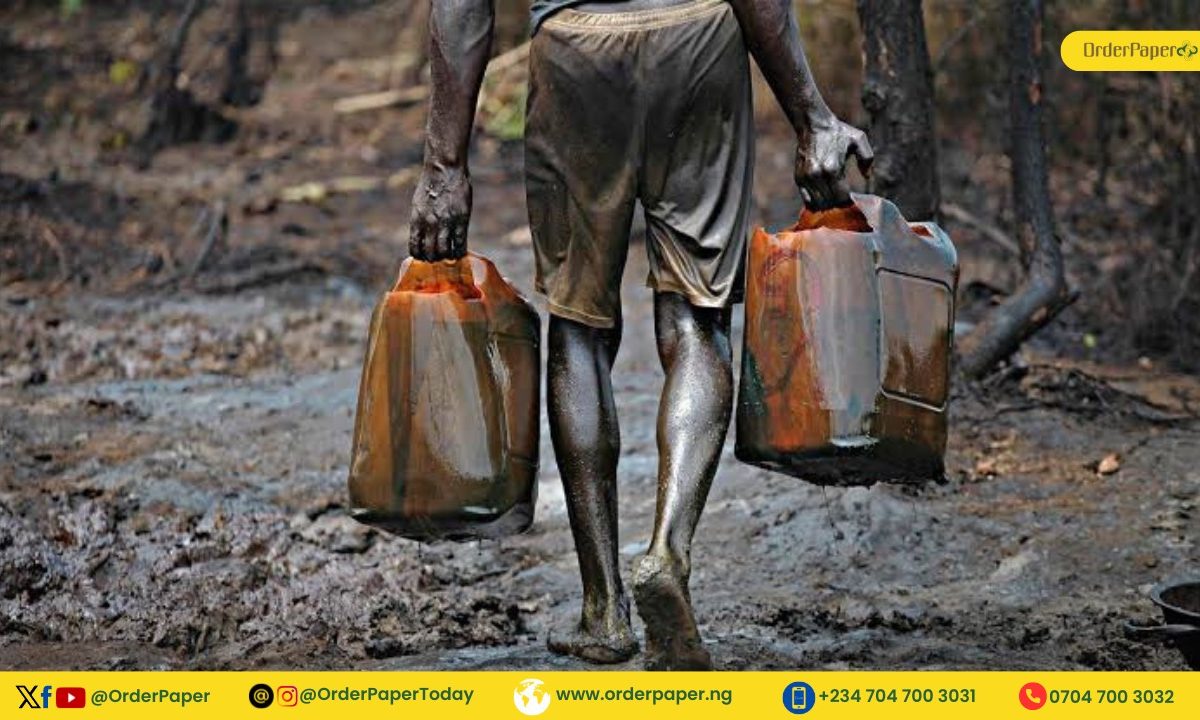Artisanal mining of crude oil in the Niger Delta Region verges on criminality. But given the scale of the activity, should the government consider making it a possible avenue for empowerment of the youths?

Energy plays an important role in the economy of any nation of the world. It directly and indirectly affects the standard of living of its citizens, the security, transport, growth and development of its society. The world is still largely run by fossil fuel which is gotten from digging the ground to obtain the black gold– crude oil.
The black gold is one of the major mineral resources obtained mainly from the Niger Delta region of Nigeria which cover the following states: Delta, Akwa-Ibom, Bayelsa, Cross River, Rivers, Edo, Ondo, Imo and Abia. Unfortunately, almost (if not all) of these states have been adversly by illegal mining, popularly referred to as crude oil theft – a challenge perpetrated by both indigenous persons and high-level cartels and that has seemingly defiled many solutions, including several parliamentary investigations.
Artisanal mining in Nigeria: a brief explainer
Artisanal mining otherwise called small scale mining and, in most cases, referred to as Artisanal and Small-Scale Mining (ASM) can be defined as an informal mining activity carried out using low technology or with minimal machinery. It is estimated that more than 100 million people rely on this sector for income, mainly in developing nations, Nigeria inclusive. An artisanal miner or small-scale miner (ASM) is a subsistence miner who is not officially employed by a mining company, but works independently, mining mineral resources using his own resources, usually by hand.
However, the Nigerian Petroleum Industry Act 2021, Minerals and Mining Act of 2007, and the Minerals and Mining regulations of 2011, which are the major laws guiding the extraction of the black gold in Nigeria, do not provide license for the extraction or mining of crude oil. The laws provide for other kind of licenses covering solid minerals except the black gold. One of the major reasons is due to the complex process of extraction and the grave environmental dangers communities face when things go awry. Thus, unlike other solid minerals, the artisanal mining of crude oil is illegal in Nigeria and is regarded as oil theft.
Section 44 (3) of the 1999 Constitution further vested the Federal Government with the ownership and control of all minerals, oils and natural gas in Nigeria, which implies that only the Federal Government has a right to deal with the mineral resources of Nigeria.
Having established the above facts, the major question is why are the youths engaging in the illegal artisanal mining of the crude oil and why are these energies not put into obtaining licenses for other kinds of mineral extraction?
Artisanal mining in the Niger Delta
Artisanal or illegal oil refining referred to locally in the Niger Delta region as ‘kpo-fire’ is a high-risk and labor-intensive processing of crude oil into various refined oil products such as petrol, kerosene, and diesel, using locally fabricated equipment in makeshift refineries. The use of rudimentary equipment and tools in the refining process enables small-scale artisanal oil refiners to move from one location to another and quickly resume operations after military raids and the destruction of illegal refineries. This can be seen as an aspect of the panoplies of counter-hegemonic resistance deployed by some aggrieved Niger Delta people.
It can be argued that crude oil theft and artisanal refining have been deployed as part of the local protest by the people of the region against the extraction and control of oil produced from the region by the federal government and oil multinationals. In contesting the ownership of the oil in the region by the state, militant Niger Delta youths claim ownership of the oil produced from their ancestral lands and waters and argue that it is unjust to accuse them of stealing what rightfully belongs to them.
Youths in the Niger Delta therefore view what the government perceives as oil theft as a form of self-repair for the region’s exploitation, environmental damage, marginalization, poverty, lack of jobs, and underdevelopment.
READ ALSO: Reps seek quick intervention in Nigeria-Cameroun border crises over gold mining
Unfortunately, the government now seems to blame the environmental degradation happening in these areas on these artisanal miners owing their crude methods of extracting the black gold. In defence, these artisanal miners believe that their contribution to the degradation is negligible as the environment had been degraded for decades by the federal government and oil companies.
Focusing on this debate could convince one that the black gold is the only mineral resource found in the Niger Delta. But there are a plethora of solid minerals found in the underbelly of the region. Below is a list of other mineral resources found in the states that make up the Niger Delta:
This implies that the government has immense responsibility to redirect the minds of youths in the Niger Delta from illegal crude oil theft to the mining of other mineral resources for several reasons, including the following:
Empowerment for the youths is the goal
This piece underscores the intricate relationship between artisanal mining and the youths of the Niger Delta. In settling the many issues barricading the growth in this region, the government should consider granting licenses to Niger Delta indigenes to own and operate private modular refineries.
Secondly, the government should harness the local ingenuity of artisanal refineries by granting licenses to refining cooperatives for them to buy crude from the government to refine for profit.
Thirdly, the government must set up modular refineries in which those with requisite skills can be recruited and gainfully employed.
Lastly, the government must redirect the focus of the youths in the Niger Delta from crude oil mining to other mineral resources as this will lead to economic resilience, environmental preservation, youth empowerment, and broader regional development.



